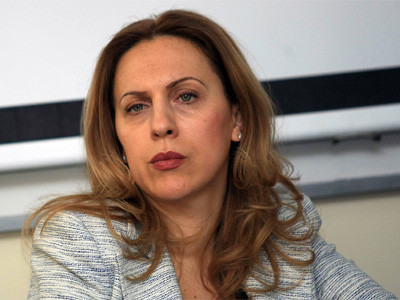Are we expecting a new global crisis – economic, debt, or financial one and how would the global threat affect this country? Yesterday, at a round table organized by the Higher School of Insurance and Finance, economists, businessmen and representatives of the government were searching for an answer to these questions but opinions differed greatly.
 Decline in economic indicators is expected in Europe this year, but in Bulgaria the trend is opposite, said Mariana Nikolova, Deputy Prime Minister for Economic and Demographic Policy.
Decline in economic indicators is expected in Europe this year, but in Bulgaria the trend is opposite, said Mariana Nikolova, Deputy Prime Minister for Economic and Demographic Policy.
“Economic forecast show slowing economic growth in Europe in 2019,” she said. “At this backdrop, the forecast for Bulgaria is for a slight acceleration in the growth of economy. Latest Eurostat data show that our economy has been performing better than the EU average. On the other hand, it needs faster rates in order to reach the living standards in Western Europe.”
The most optimistic forecast came from Deputy Minister of Economy Lachezar Borissov, who said that in the next two, three or four years, there would be no economic crisis in this country, as long as there were no ‘cataclysms coming from the global economic environment’. He added that this country was approaching the peak of its economic growth and would needs to prepare in a few years to face economic upheaval.
 “There are some regional trends that have a global impact," the Deputy Minister said. “For example, these are the state of Chinese economy, Brexit, Russia-Ukraine relations. In this area, however, we must be very careful, because excessive sanctioning regimes can have a direct impact on Bulgarian economy. Of course, as an EU Member State, will be working to prevent this, but the truth is that we are dependent on the supply of energy resources. On a more local scale, Kosovo-Serbia relations may be problematic.”
“There are some regional trends that have a global impact," the Deputy Minister said. “For example, these are the state of Chinese economy, Brexit, Russia-Ukraine relations. In this area, however, we must be very careful, because excessive sanctioning regimes can have a direct impact on Bulgarian economy. Of course, as an EU Member State, will be working to prevent this, but the truth is that we are dependent on the supply of energy resources. On a more local scale, Kosovo-Serbia relations may be problematic.”
Globalization or regionalization - this is the main economic question, according to Lachezar Borissov.
“My assumption is that we will be talking more about regionalization and we will be much stronger on a regional scale together with the EU," he said. “That is why we put the topic of joining the euro area on the agenda. The advantages of Bulgaria are currently in sustainable economic growth with a forecast of 3.7% in 2019, as well as good credit rating and the fact that we are third in the EU in terms of financial stability.”
Assoc. Prof. Daniela Bobeva, who presented the main report, however, does not share this optimism. “If we asked a random person in the street whether a new crisis was coming, they would laugh at us and say we have been in crisis for 30 years,” she said. According to her, the slowdown of economic growth to 2.7% in the third quarter of last year is among the symptoms of a looming crisis together with the change in the pattern of growth that is influenced by domestic demand. Nearly 45 per cent of GDP is created by multinational companies, and this can also be a path for economic shocks, the expert added. According to her there were three scenarios that were most likely to happen in Bulgaria.
 “The worst option, which may happen as early as next year depends on the decision of the European Central Bank and the European Commission whether this country would enter the so-called Eurozone waiting room. The second danger lies in a possible recession in the euro area and the third is related to potential economic and political instability in this country. And if some of these risks were realized and deterioration in exports continued, it would lead us to a crisis and recession in 2020.”
“The worst option, which may happen as early as next year depends on the decision of the European Central Bank and the European Commission whether this country would enter the so-called Eurozone waiting room. The second danger lies in a possible recession in the euro area and the third is related to potential economic and political instability in this country. And if some of these risks were realized and deterioration in exports continued, it would lead us to a crisis and recession in 2020.”
But if we put our rose colored glasses on, we may see an economic growth of 2.5-3% this and next year, adopting the currency mechanism in July, resulting in an economic decline instead of a recession or crisis, Daniela Bobeva added.
English: Alexander Markov
Photos: BGNESAcceleration of inflation to 1.1% in October compared to the previous month was registered by the National Statistical Institute. On an annual basis, the index is 1.8 percent. In October, the prices of goods and services for..
A working group comprising representatives of employers, trade unions and government experts is discussing the proposals of the Ministry of Labor and Social Policy for introducing a new mechanism to determine the minimum wage. This is happening a day..
“The main priorities businesses have – membership of the Eurozone and accession to the Schengen area by land – have receded to the background. They are the motors which can boost the economy, but the fact there is no regular government is an obstacle..
There has been an upsurge in the economy in every region of Bulgaria, the effects of the Covid crisis have been overcome, tourism has fully recovered,..

+359 2 9336 661
